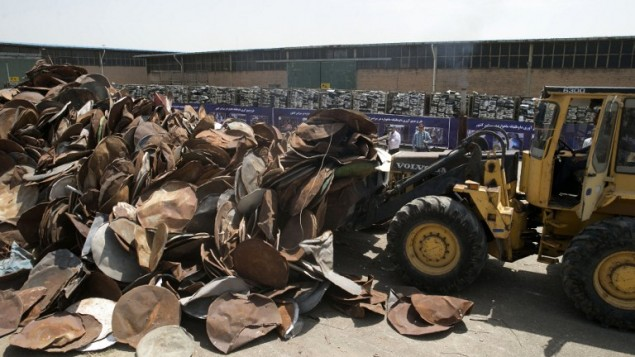
All internal and external Iranian broadcast media falls under the aegis of the Islamic Republic of Iran Broadcasting (IRIB), a state-owned umbrella organization constitutionally mandated to serve as Iran’s sole legal TV and radio broadcaster. According to the Islamic Republic’s constitution, “The mass-communication media, radio, and television, must serve the diffusion of Islamic culture in pursuit of the revolutionary course of the Islamic Revolution.” In effect, the state maintains a monopoly over all television and radio broadcasting, with the aim of propagating its brand of Islam.
Domestically, IRIB is an instrument of Iran’s efforts to preserve the Islamic Revolution through repression. The U.S. Department of the Treasury sanctioned IRIB in February 2013 over its usage of “state-media transmissions to trample dissent.” Treasury also sanctioned then-IRIB chief, Ezzatollah Zarghami, under Executive Order (E.O.) 13628, which gives Treasury the authority to designate those who “have engaged in censorship or other activities with respect to Iran on or after June 12, 2009.” Treasury’s press release noted that the EU had sanctioned Zarghami in 2012 for authorizing the broadcast of “show trials that constituted a clear violation of international provisions on fair trials and the right to due process,” and several European satellite providers subsequently removed IRIB offerings from their service.
Treasury further cited “distorted or false IRIB news reports and the broadcasting of forced confessions of political detainees” and IRIB’s role in jamming satellite transmissions of Western-produced Persian language news broadcasts, as the impetus behind designating IRIB. While satellite dishes are officially proscribed in the Islamic Republic, a majority of Iran’s citizens own the illegal devices, giving them access to dozens of non-state approved Farsi-language news broadcasts, such as BBC Persian, Voice of America, Radio Farda, Iran International, or Manto News, as well as Western entertainment, and film channels. According to one estimate, seventy percent of the Iranian population use satellite television.
Both the U.S. and EU opted to waive their sanctions against IRIB during the Iran nuclear deal negotiating process, enabling IRIB channels to return to Europe’s airwaves. Despite levying sanctions against IRIB senior officials in November 2022, including its current chief, Peyman Jebelli, the Biden administration renewed waivers on sanctions against IRIB in February 2023. According to Treasury’s sanctions press release, the state-run media organ, working in tandem with the IRGC and the Ministry of Intelligence (MOI), regularly “uses falsified news to misinform and falsely incriminate perceived enemies of the regime.”
The advent of Starlink, a satellite internet provider owned by SpaceX, has provided Iranians with another alternative information stream that rivals state-controlled media. Starlink terminals allow Iranians not only to gain access to internet news sources the regime has banned, but they can also be used to transmit critical information to the outside world, including the regime’s use of brutality and violence. That was part of the impetus behind the U.S. Treasury Department’s decision to issue Iran General License D-2 in September 2022, which among other things authorizes the export of “communication tools to assist ordinary Iranians in resisting repressive internet censorship and surveillance.” Satellite internet access counters Iran’s ideological expansion, which partly depends on monopolizing the flow of information out of Iran in order to present the regime’s activities in a favorable light.
The U.S. Directorate of National Intelligence’s (DNI) Open-Source Center estimated in 2009 that IRIB’s annual budget was $900 million per year, and approximately 46000 personnel were employed there, making it one of the Middle East’s largest news organizations. In early 2015, at the height of Iran’s financial crisis catalyzed by a robust international sanctions regime and a sustained drop in energy prices, Iran shuttered IRIB news outlets in the Middle East, Central Asia, Europe, and Latin America. As an immediate consequence of international sanctions, the IRIB’s annual budget dropped to as low as $300 million. However, since receiving a sanctions relief windfall valued at over $100 billion in the wake of the Joint Comprehensive Plan of Action (JCPOA), Iran has reinvigorated IRIB’s global footprint. Iran’s parliament voted in January 2017 to double IRIB’s annual budget to $750 million.
IRIB offers both domestic and foreign radio and television services, managing 12 domestic television channels, four international television news channels, six satellite television channels and 30 provincial television channels.” According to Al-Monitor, IRIB “runs dedicated news channels in English, Arabic and Spanish while broadcasting in more than 30 languages, including Bosniak, Azerbaijani, Mandarin, Malay and Albanian.
Iran’s constitution gives the Supreme Leader the power to select the head of IRIB. Accordingly, the media conglomerate has been run by conservative and hardliners loyal to Khamenei since he assumed the role of Supreme Leader. IRIB’s mission is to provide consistent messaging in pursuit of the regime’s domestic, foreign policy, and military goals. Its programming aims to strengthen morality and religiosity in Iranian society, to uphold Iran’s revolutionary ethos, and to provide viewers a theoretical foundation for Khomeinist principles, such as velayat-e faqih, the invocation of rule by clerics from which the Supreme Leader’s absolute authority is derived. According to its charter, among IRIB’s guiding principles are conveying "The majesty of spirit of the Islamic revolution as well as that of constitution over all of the programs” and "The fulfillment of the Supreme Leader's point of view as the Islamic Jurisprudent."
As such, IRIB has served as a crucial institutional pillar of support for Iran’s hardline establishment in its factional struggles with reformists, shaping Iranian perceptions of the news in accordance with the regime’s prevailing worldview. IRIB has been an important agent in thwarting societal and political liberalization sought by reformist politicians and protestors, branding government opponents as enemies or foreign agents.
As student protests rocked Iran in 1999, IRIB became a target of the demonstrators’ ire due to its biased reporting and inadequate coverage of the unrest. IRIB played a similar obscurantist role during the bitterly disputed 2009 election, giving minimal coverage to the massive Green Movement protests, selectively using footage to tar demonstrators as merely “hooligans” rioting, and labeling opposition leaders and activists as “seditionists.” The broadcaster also initially chose to ignore the killing of protestor Neda Aghan Soltan at the hands of the Basij, acknowledging her death only after it crystallized an international uproar, and then conspiratorially painting the incident as “phony” or a fabricated Western media plot to undermine the Basij. IRIB also earned domestic and international opprobrium for broadcasting show trials and coerced confessions of Green Movement leaders and activists, a key factor in the previously-mentioned U.S. and EU’s imposition of sanctions against IRIB and its leadership.
While IRIB’s heavy-handed methods have given its news programs a reputation for peddling pro-regime propaganda, a 2012 U.S. government funded survey found that 86% of Iranians still count IRIB among their top three sources of news, even though only half of the respondents classified IRIB’s news content as “very trustworthy.” IRIB continues to dominate Iranian news consumption despite the mounted challenge posed by Persian-language news offerings by Western media organs, such as BBC and Voice of America, seeking to provide an alternative point of view to Iranian audiences. Iranian authorities regard these broadcasts with fear and mistrust, viewing them as a threat to their continued cultural hegemony. Iran accordingly invests heavily in censorship efforts, including jamming of international satellite broadcasts. Iranian police also regularly conduct raids to seize illegally possessed satellite dishes, and the IRGC’s Basij militia have staged ceremonies in which they destroy massive quantities of the corrupting devices.
In September 2021, there was a leadership change at the IRIB. The Supreme Leader appointed the former head of IRIB World Service, Peyman Jebelli, to be the new head of the IRIB. With many Iranians tired of the filtered regime content and seeking other forms of information, Jebelli reportedly promised change and a restoration of public trust, but the regime hardliner will likely continue to act in favor of the IRGC and the Supreme Leader, lest he is forced out of office before his tenure expires. Immediately upon taking his post at IRIB, he installed individuals with close ties to the IRGC to senior management positions. Jebelli, a former ambassador to Tunisia and deputy secretary of Iran’s Supreme National Security Council (SNSC) for Media Affairs, is thought to have a close relationship with Mojtaba Khamenei, the son of the Supreme Leader, and is thus a regime insider. Prior to his current position, Jebelli pumped out stories on Press TV opposed to the nuclear deal between Iran, the U.S., and other world powers, often contradicting the messaging of the Iranian negotiating team.
The IRGC has a strong influence over what information does and does not get publicized on IRIB television stations and radio. In 2016, a former IRIB chief, Mohammad Sarafraz, was forced out of his tenure before his official term ended, because of his conflict with the IRGC, which he described as a “mafia.” The IRGC is poised to capitalize on its links to Jebelli to exert greater control over the institution. From early in his tenure, Jebelli began purging and demoting more moderate top officials at the network and hiring journalists from the IRGC-controlled Fars and Tasnim news agencies in an effort to establish the IRIB as a propaganda tool for regime hardliners.
Moreover, IRGC intelligence officials are increasingly involved in the production of news stories, rather than IRIB journalists. In December 2022, former IRIB chief Mohammad Sarafraz publicly spoke out against systemic corruption and the prevalent manipulation of news coverage at the IRIB by certain unnamed individuals from Iran’s intelligence services—likely the IRGC’s Intelligence Organization or the MOI. According to Sarafraz, who was reportedly ousted from his post in 2016 as a result of a coordinated effort by the Supreme Leader’s powerful son, Mojtaba Khamenei, and then-IRGC Intelligence Organization chief, Hossein Taeb, intelligence officials “control the state television and order it how to report events, how to get forced confessions from political prisoners, and how to broadcast them.”
The IRIB was undergoing significant downsizing in early 2022, but extensive Iranian oil sales to China as a result of lax U.S. sanctions enforcement may lead to replenished IRIB coffers. In February 2022, the London-based Iran International reported “the imminent closure of most of [IRIB’s] bureaus abroad,” with the possible exception of its New York and London offices. The decision to downsize may relate to the Supreme Leader’s announcement of “vindication jihad,” which some observers view as a call to arms directed at the “soldiers of soft war,” namely media employees. Under this dictate, made on the day prior to the news of the IRIB office closures, media employees are expected to propagate Khomeini’s vision and ideology. Thus, the office closures could be part of a concerted effort to consolidate control over the vast Iranian media empire and bring it back into line with conservative aims.
